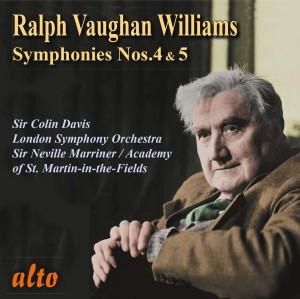
Ralph Vaughan Williams (1872-1958)
Symphony No. 4 in F minor (1934)
Symphony No. 5 in D major (1938-43)
London Symphony Orchestra/Sir Colin Davis (4)
Academy of St. Martin-in-the-Fields/Sir Neville Marriner (5)
rec. 2008, The Barbican, London (4); 1990, Henry Wood Hall, London (5). DDD
ALTO ALC1470 [71]
This disc was admiringly reviewed quite recently by our Founding Editor RB, and both PCG (review) and I (review) were very positive about Pristine’s revitalisation of Boult’s 1953 recordings of the same symphonies into XR Ambient Stereo, all of which makes a useful basis for comparison for giving my response to this budget release of these previously neglected accounts.
This Fourth has not previously been issued separately, only as part of the 4 CD (plus DVD) “Sir Colin Davis Anthology” on the LSO Live label. It is given a hard, driven reading and suffers no detriment from being recorded live in the Barbican. There is no audience noise and balances between groups of instruments are excellent; the timpani, in particular, are nicely prominent. RB is right when he observes that the listener might sometimes wonder whether Davis could relax a little more in the lyrical counter-melodies and interludes but he is concerned to bring out and maintain the menace underlying this unsettling music until the serene conclusion and the result is aesthetically consistent and satisfying. I like the way Davis accentuates the mildly jolly and even humorous elements in the tempestuous finale of a symphony which is predominately dark and angry – and the brief, dreamy central section forms an oasis of calm in an essentially propulsive reading. The climax of the Allegro molto rivals Bernstein’s for thrills and the proficiency and unanimity of the LSO in concerted passages are admirable, too. One does not necessarily associate Colin Davis with RVW but this performance demonstrates his considerable affinity with his music – and also, especially in the Andante, his irritating propensity for grunting and singing along too audibly as he aged.
I admit to being taken by surprise by both the weight and sensitivity of Marriner’s Fifth here. Evidently the ASMF must be supplemented way beyond their customary large chamber group size and by that I am not suggesting that as a conductor Sir Neville was in any sense lacking in emotional depth – I simply did not expect to hear him so completely immersed in the Vaughan Williams idiom; this is a grand, stately but also supremely tender account which holds back not a jot at the climactic point of the first movement before the wistful coda.
At first I thought the rather dull, removed recording acoustic was going to be a problem, but it lends a certain gauzy allure to the sound – which is perhaps least apt in the second movement scherzo which could do with more punch and definition but the actual playing is as fleet and light as you might expect from a conductor and orchestra who specialised in string serenades and the like. The tempo of the introduction to the first movement is perhaps a little too fast for some tastes but the Romanza is perfectly paced and this time the reverberation places a golden halo around those soaring, yearning strings and the questing flute and woodwind. This is not music which needs to be spotlit and clarified but to be bathed in, and the virtuosity of the ASMF soloists is very apparent.
For all the delicacy of the orchestral playing, there is nothing in the least over-refined or mimsy about the Passacaglia, which is robustly propulsive before the music melts into the almost unbearably poignant ending, in which the phrasing and dynamics are moulded with utmost care.
I congratulate Alto’s apt sense of timing in liberating from the vaults, in this Vaughan Williams anniversary year, two of the finest – if very different – interpretations of his symphonies I have encountered.
Ralph Moore
Previous review: Rob Barnett (October 2022)
Help us financially by purchasing from



















